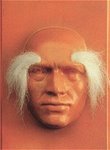
Upon first reading, this is a thought provoking essay from today's Guardian:
Here's the full article: http://books.guardian.co.uk/departments/politicsphilosophyandsociety/story/0,,2067489,00.html
but I'll try to provide a precis - it's Oliver Burkeman's examination of 'Black Swan Theory'. The name originates from the philosophical observation that you can never know for certain 'all swans are white' - the sight of one black swan disproves the statement. Life can surprise.
It is also the title of a book by Nassim Nicholas Taleb, who cites September 11 as an example of a black swan event - huge, shocking and leaving a devastating impact. In retrospect, commentators state the tragedy was predictable. Taleb thinks it should be acknowledged as unpredictable (he argues that before 9/11, it would have been impossible to convince airlines to reinforce cockpit doors) and furthermore, we have to accept randomness in our lives. For him, we try to explain the past because it helps us believe we have full control of the future.
At times, his thoughts do not ring true, but his experience as a trader is eye-opening. He decided to trade in options, operating on the basis that he believed something unpredictable would eventually happen. Most days, it didn't and he lost a small amount of money; but, after a while, along came a black swan, he made a fortune and had the basis for a book.
It's a philosophy that warns against the danger of adherence to narrative and retrospective explanation. Fair point, but strip away the marketability of the 'black swan' branding and we're left with a book that, by warning against the allure of self help books, offers a guide to life. It is a more than a little bit ironic, particularly when you consider that one of the more predictable outcomes of a maverick deciding to live a quirky life, is that he will generously share his short term 'journey' with the book-buying public at a later date. It reeks of commercial cynicism.
The public knows life can be random but it is also aware that actions and environment can shape destines. A resident of an inner city council estate, having the good fortune to live to 100, will not receive shredded actuarial tables with his letter from the Queen. Taleb is right to mention longevity as an example of unpredictability but wrong to use it as basis for a philosophy.
His theory is not a book, it's a T-shirt. Life, in most parts of the bell curve, will continue in largely predictable fashion. Taleb knows this, but also knows about black swans.
Most of us know it, but also know 'shit happens.'
but I'll try to provide a precis - it's Oliver Burkeman's examination of 'Black Swan Theory'. The name originates from the philosophical observation that you can never know for certain 'all swans are white' - the sight of one black swan disproves the statement. Life can surprise.
It is also the title of a book by Nassim Nicholas Taleb, who cites September 11 as an example of a black swan event - huge, shocking and leaving a devastating impact. In retrospect, commentators state the tragedy was predictable. Taleb thinks it should be acknowledged as unpredictable (he argues that before 9/11, it would have been impossible to convince airlines to reinforce cockpit doors) and furthermore, we have to accept randomness in our lives. For him, we try to explain the past because it helps us believe we have full control of the future.
At times, his thoughts do not ring true, but his experience as a trader is eye-opening. He decided to trade in options, operating on the basis that he believed something unpredictable would eventually happen. Most days, it didn't and he lost a small amount of money; but, after a while, along came a black swan, he made a fortune and had the basis for a book.
It's a philosophy that warns against the danger of adherence to narrative and retrospective explanation. Fair point, but strip away the marketability of the 'black swan' branding and we're left with a book that, by warning against the allure of self help books, offers a guide to life. It is a more than a little bit ironic, particularly when you consider that one of the more predictable outcomes of a maverick deciding to live a quirky life, is that he will generously share his short term 'journey' with the book-buying public at a later date. It reeks of commercial cynicism.
The public knows life can be random but it is also aware that actions and environment can shape destines. A resident of an inner city council estate, having the good fortune to live to 100, will not receive shredded actuarial tables with his letter from the Queen. Taleb is right to mention longevity as an example of unpredictability but wrong to use it as basis for a philosophy.
His theory is not a book, it's a T-shirt. Life, in most parts of the bell curve, will continue in largely predictable fashion. Taleb knows this, but also knows about black swans.
Most of us know it, but also know 'shit happens.'






